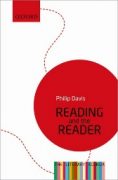 Professor Philip Davis
Professor Philip Davis
Professor of Literature
Psychological Sciences
Director of CRILS (Centre For Research In Reading, Information And Linguistic Systems), University of Liverpool
Editor, The Reader magazine
Philip Davis is editor of The Reader magazine and director of a Centre for Research into Reading (CRILS) at the University of Liverpool, as well as being a Professor of English literature. His publications include works on Shakespeare, Samuel Johnson, The Victorians, Bernard Malamud, as well as books on reading itself (The Experience of Reading; Real Voices: On Reading). He is committed to the relation to literature to the wider world and is a member of the The Reader Organization, an outreach charity which brings reading-aloud to shared-reading groups in a variety of settings from dementia wards to facilities for looked-after children, including libraries, drug rehabilitation centres, mental health drop-in clinics and prisons.
 The book Reading and the Reader by Philip Davis offers a defence of reading serious literature, where reading offers a place for inner contemplation, emotion, imagination, and thought-experiment through the energising booster-rocket of literature. It is argued that literature creates a holding-ground in which a dense sense of experience is registered. Such a place is vital to human well-being in the following respects: in sustaining the ability to use and not just suffer one’s experience; to be able to think one’s thoughts, even those that are customarily unadmitted or felt as anomalous or unworthy; to find room for a realm of speculation in between religions and secularization, in between literature and life. Reading and the Reader, one of the first volumes in the Literary Agenda series, exists to defend the value of reading, to narrow the gaps between the way writers and readers think, to bring literary thinking into the ordinary thinking of the world – especially at a time when the arts and humanities are under some threat. Literature is useful in terms of deep human needs. It offers a form of time-travel – across ages, countries, different minds – that provides alternatives to any conventional worldview.
The book Reading and the Reader by Philip Davis offers a defence of reading serious literature, where reading offers a place for inner contemplation, emotion, imagination, and thought-experiment through the energising booster-rocket of literature. It is argued that literature creates a holding-ground in which a dense sense of experience is registered. Such a place is vital to human well-being in the following respects: in sustaining the ability to use and not just suffer one’s experience; to be able to think one’s thoughts, even those that are customarily unadmitted or felt as anomalous or unworthy; to find room for a realm of speculation in between religions and secularization, in between literature and life. Reading and the Reader, one of the first volumes in the Literary Agenda series, exists to defend the value of reading, to narrow the gaps between the way writers and readers think, to bring literary thinking into the ordinary thinking of the world – especially at a time when the arts and humanities are under some threat. Literature is useful in terms of deep human needs. It offers a form of time-travel – across ages, countries, different minds – that provides alternatives to any conventional worldview.
Resource: Oxford University Press
